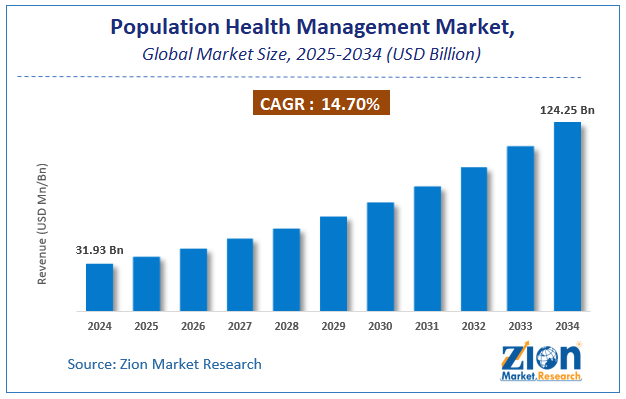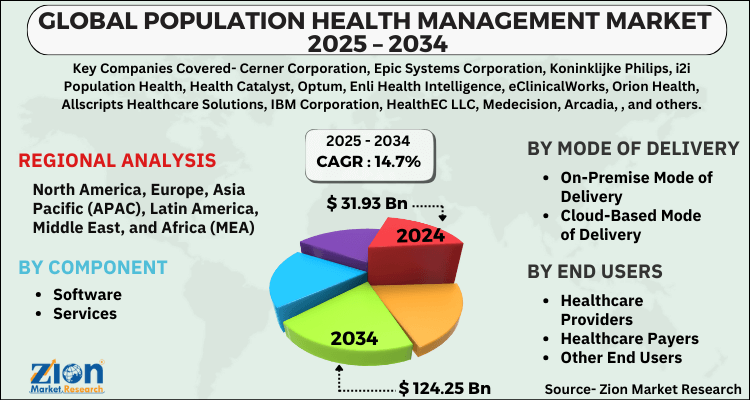Population Health Management Market Size, Share, Trends, Growth 2034

Population Health Management Market By Component (Software and Services), By Mode of Delivery (On Premise and Cloud Bases), By End Users (Health Care Providers, Health Care Payers and Other End Users), and By Region - Global and Regional Industry Overview, Market Intelligence, Comprehensive Analysis, Historical Data and Forecasts 2025 - 2034
| Market Size in 2024 | Market Forecast in 2034 | CAGR (in %) | Base Year |
|---|---|---|---|
| USD 31.93 Billion | USD 124.25 Billion | 14.7% | 2024 |
Population Health Management Market: Industry Perspective
The global population health management market size was worth around USD 31.93 Billion in 2024 and is predicted to grow to around USD 124.25 Billion by 2034 with a compound annual growth rate (CAGR) of roughly 14.7% between 2025 and 2034. The report analyzes the global population health management market's drivers, restraints/challenges, and the effect they have on the demands during the projection period. In addition, the report explores emerging opportunities in the population health management industry.
Population Health Management Market: Overview
Any hospital relies on its patients' health information. Technology adoption is accelerating in a variety of businesses. As a result, the efficiency of the organization is increasing. In numerous instances, patient information is disorganized. It leads to a host of problems in the medical area. This is where a population health management system can help by compiling and recording manageable patient data. It’s a business intelligence system that simplifies patient storage.
Government requirements and support for healthcare IT solutions, the growing use of big data analytics, and the need to curb escalating healthcare costs are the primary factors driving the growth of the population health management market. Furthermore, the expansion of emerging economies (such as Brazil, Russia, India, South Korea, and China), a growing emphasis on personalized medicine, and a growing emphasis on value-based medicine are expected to provide lucrative growth opportunities for market participants during the forecast period. However, data breaches, a shortage of experienced analysts, and interoperability concerns limit the market's growth.
Key Insights
- As per the analysis shared by our research analyst, the global population health management market is estimated to grow annually at a CAGR of around 14.7% over the forecast period (2025-2034).
- Regarding revenue, the global population health management market size was valued at around USD 31.93 Billion in 2024 and is projected to reach USD 124.25 Billion by 2034.
- The population health management market is projected to grow at a significant rate due to increasing focus on value-based care, the rising prevalence of chronic diseases, and the need to reduce healthcare costs by improving patient outcomes and managing population health risks.
- Based on Component, the Software segment is expected to lead the global market.
- On the basis of Mode of Delivery, the On Premise segment is growing at a high rate and will continue to dominate the global market.
- Based on the End Users, the Health Care Providers segment is projected to swipe the largest market share.
- Based on region, North America is predicted to dominate the global market during the forecast period.
Population Health Management Market: Opportunities
Advance analytics and predictive modeling applications to bring growth opportunities to the global market
Advanced analytics and predictive modeling applications enable healthcare organizations to treat each patient individually to achieve the best possible outcomes. Analytics have increasingly been used to personalize cancer and other disease treatments. In this regard, the UK's National Health Service (NHS) announced a five-year initiative to sequence the genomes of a large group of people. A new company called Genomics England Limited was formed to carry out this project, and a huge amount has been set aside for it. This project's findings will be applied to the treatment and research of cancer and other rare diseases.
Population Health Management Market: Challenges
The diversity & complexity of the population health management market may give rise to challenges for its growth
Only a few healthcare organizations have in-house experts who can translate large amounts of data into valuable insights. One of the significant barriers to the growth of the population health management market is a lack of data management capabilities and skilled analysts.
Major markets like Germany, the Netherlands, England, and Australia are also experiencing a severe shortage of HCIT professionals. During the forecast period, the population health management market is expected to be hampered by a lack of in-house IT experts as well as a trained workforce with cross-functional skills.
Population Health Management Market: Report Scope
| Report Attributes | Report Details |
|---|---|
| Report Name | Population Health Management Market |
| Market Size in 2024 | USD 31.93 Billion |
| Market Forecast in 2034 | USD 124.25 Billion |
| Growth Rate | CAGR of 14.7% |
| Number of Pages | 150 |
| Key Companies Covered | Cerner Corporation, Epic Systems Corporation, Koninklijke Philips, i2i Population Health, Health Catalyst, Optum, Enli Health Intelligence, eClinicalWorks, Orion Health, Allscripts Healthcare Solutions, IBM Corporation, HealthEC LLC, Medecision, Arcadia, , and others. |
| Segments Covered | By Component, By Mode of Delivery, By End Users, and By Region |
| Regions Covered | North America, Europe, Asia Pacific (APAC), Latin America, The Middle East and Africa (MEA) |
| Base Year | 2024 |
| Historical Year | 2020 to 2023 |
| Forecast Year | 2025 - 2034 |
| Customization Scope | Avail customized purchase options to meet your exact research needs. Request For Customization |
Population Health Management Market: Segmentation
The global population health management market is segregated based on components and end users.
Based on components, the Population Health Management market is divided into 2 segments- software and services. The dominance of the software segment can be ascribed to payers' and providers' growing use of software solutions to reduce readmissions, boost cost-effectiveness, improve operational efficiency, promote patient engagement, and facilitate data integration and analysis. In terms of services, which frequently require renewal on a time-based basis, including service upgrades and the maintenance of PHM Programs, have been essential in dominating these devices in the global market.
Based on end-user, the Population Health Management market is divided into 3 segments healthcare providers, healthcare payers, and other end users. The implementation of the Affordable Care Act and the Hospital Readmissions Reduction Program (aimed at lowering healthcare costs by using novel population health management solutions) in the United States, as well as the high demand for these solutions among healthcare providers across regions, account for a large share of this segment.
Population Health Management Market: Regional Landscape
North America leads the global population health management market because of growing federal healthcare and rising government initiatives. The Asia Pacific market, which includes India, China, Japan, and the rest of Asia Pacific, provides market participants with high-growth opportunities.
Rising medical tourism, the implementation of new ICT guidelines in Japan, investments, and reforms to modernize China's healthcare infrastructure, India's rapidly growing healthcare industry, and IT programs in Australia and New Zealand are all driving growth. Furthermore, government initiatives to adopt HCIT, the growing geriatric population, the rising prevalence of chronic diseases, rising healthcare expenditure, and increasing consumer purchasing power are expected to support market growth in this region.
Population Health Management Market: Competitive Landscape
Some of the main competitors dominating the global population health management market include:
- Cerner Corporation
- Epic Systems Corporation
- Koninklijke Philips
- i2i Population Health
- Health Catalyst
- Optum
- Enli Health Intelligence
- eClinicalWorks
- Orion Health
- Allscripts Healthcare Solutions
- IBM Corporation
- HealthEC LLC
- Medecision, Arcadia
- athenahealth (US)
- Cotiviti
- NextGen Healthcare, Inc.
- Conifer Health Solutions
- SPH Analytics
- Lightbeam Health Solutions
- Innovaccer
- Citra Health Solutions
- Evolent Health, Inc.
- Lumeris
- Forward Health Group.
The global population health management market is segmented as follows:
By Component
- Software
- Services
By Mode of Delivery
- On-Premise Mode of Delivery
- Cloud-Based Mode of Delivery
By End Users
- Healthcare Providers
- Healthcare Payers
- Other End Users
By Region
- North America
- The U.S.
- Canada
- Mexico
- Europe
- France
- The UK
- Spain
- Germany
- Italy
- Rest of Europe
- Asia Pacific
- China
- Japan
- India
- Australia
- South Korea
- Rest of Asia Pacific
- The Middle East & Africa
- Saudi Arabia
- UAE
- Egypt
- Kuwait
- South Africa
- Rest of the Middle East & Africa
- Latin America
- Brazil
- Argentina
- Rest of Latin America
Table Of Content
Methodology
FrequentlyAsked Questions
The global population health management market is expected to grow due to rising healthcare costs, increasing focus on value-based care, advancements in healthcare IT, the need for improved patient outcomes, and the growing emphasis on preventive care and chronic disease management.
According to a study, the global population health management market size was worth around USD 31.93 Billion in 2024 and is expected to reach USD 124.25 Billion by 2034.
The global population health management market is expected to grow at a CAGR of 14.7% during the forecast period.
North America is expected to dominate the population health management market over the forecast period.
Leading players in the global population health management market include Cerner Corporation, Epic Systems Corporation, Koninklijke Philips, i2i Population Health, Health Catalyst, Optum, Enli Health Intelligence, eClinicalWorks, Orion Health, Allscripts Healthcare Solutions, IBM Corporation, HealthEC LLC, Medecision, Arcadia, , among others.
The report explores crucial aspects of the population health management market, including a detailed discussion of existing growth factors and restraints, while also examining future growth opportunities and challenges that impact the market.
RelatedNews
HappyClients
Zion Market Research
Tel: +1 (302) 444-0166
USA/Canada Toll Free No.+1 (855) 465-4651
3rd Floor,
Mrunal Paradise, Opp Maharaja Hotel,
Pimple Gurav, Pune 411061,
Maharashtra, India
Phone No +91 7768 006 007, +91 7768 006 008
US OFFICE NO +1 (302) 444-0166
US/CAN TOLL FREE +1 (855) 465-4651
Email: sales@zionmarketresearch.com
We have secured system to process your transaction.
Our support available to help you 24 hours a day, five days a week.
Monday - Friday: 9AM - 6PM
Saturday - Sunday: Closed






